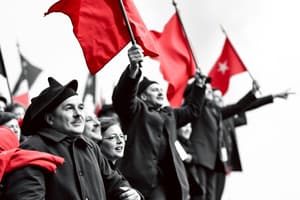Podcast
Questions and Answers
What event marked a significant turning point in European history and saw France transitioning from monarchy to a republic?
What event marked a significant turning point in European history and saw France transitioning from monarchy to a republic?
- The Treaty of Versailles
- The Battle of Waterloo
- The Siege of Stalingrad
- The storming of the Bastille (correct)
Which revolution transformed Russia into the Soviet Union and had far-reaching consequences worldwide?
Which revolution transformed Russia into the Soviet Union and had far-reaching consequences worldwide?
- The Industrial Revolution
- The Russian Revolution (correct)
- The American Revolution
- The Mexican Revolution
Who assumed leadership of the National Socialist German Workers' Party in July 1921?
Who assumed leadership of the National Socialist German Workers' Party in July 1921?
- Winston Churchill
- Benito Mussolini
- Adolf Hitler (correct)
- Joseph Stalin
How did the Russian Revolution occur in two stages?
How did the Russian Revolution occur in two stages?
Which event led to the era of totalitarianism in Germany and eventually to the horrors of the Holocaust?
Which event led to the era of totalitarianism in Germany and eventually to the horrors of the Holocaust?
What key event occurred during the October phase of the Russian Revolution?
What key event occurred during the October phase of the Russian Revolution?
What were key factors that led to the French Revolution?
What were key factors that led to the French Revolution?
What was a significant outcome of the French Revolution?
What was a significant outcome of the French Revolution?
What were some reasons behind the Russian Revolution?
What were some reasons behind the Russian Revolution?
Which political party did Adolf Hitler establish in 1920?
Which political party did Adolf Hitler establish in 1920?
How did Napoleon Bonaparte gain power after the French Revolution?
How did Napoleon Bonaparte gain power after the French Revolution?
What was a consequence of Hitler's rise to power in Germany?
What was a consequence of Hitler's rise to power in Germany?
What is the primary goal of colonization?
What is the primary goal of colonization?
Which European country had one of the largest imperial expansions through colonization?
Which European country had one of the largest imperial expansions through colonization?
What were some of the cultural changes brought by colonial empires to local populations?
What were some of the cultural changes brought by colonial empires to local populations?
Which event marked a significant turning point in French history and led to the transition from monarchy to a republic?
Which event marked a significant turning point in French history and led to the transition from monarchy to a republic?
Which revolution transformed Russia into the Soviet Union with worldwide consequences?
Which revolution transformed Russia into the Soviet Union with worldwide consequences?
What was a key factor contributing to the rise of Adolf Hitler in Germany?
What was a key factor contributing to the rise of Adolf Hitler in Germany?
Flashcards are hidden until you start studying
Study Notes
History: Revolutions, Coups, and Wars
Throughout history, revolutions have been shaped by complex factors such as social, economic, and political conditions. One revolution that marked a significant turning point in European history was the French Revolution, which lasted from 1789 to 1799. This period saw France transitioning from monarchy to a republic, with key events like the storming of the Bastille and the Reign of Terror leaving indelible marks on global politics.
The Russian Revolution also played a crucial role in shaping modern history, occurring in two stages: firstly in February 1917 during World War I due to domestic food shortages and unrest among soldiers, and later in October when the Bolsheviks seized power. This event transformed Russia into the Soviet Union and had far-reaching consequences around the world, spawning numerous communist parties and uprisings.
Another significant episode in recent history is the rise of Adolf Hitler and Nazi Germany. Hitler assumed leadership of the National Socialist German Workers' Party (NSDAP) in July 1921 and gradually consolidated his power through various means. His election as chancellor in January 1933 began the era of totalitarianism in Germany, leading eventually to the horrors of the Holocaust and World War II.
These events demonstrate how power struggles within societies can lead to profound societal changes. They serve as reminders that even under seemingly stable systems, underlying tensions and discontent can erupt into revolutionary movements or oppressive regimes.
Studying That Suits You
Use AI to generate personalized quizzes and flashcards to suit your learning preferences.




